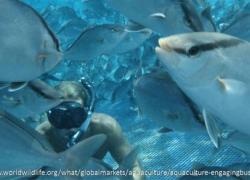
Aquaculture can be defined as the farming of water creatures and organisms such as fish or shellfish that can be done in a natural or artificial habitat. Since 1994, the WWF (World Wide Fund for Nature) started working on aquaculture, supporting research projects and trying to come up with an analytic comparison between the impacts of shrimp aquaculture and shrimp trawling. Working hard to reduce the major impacts of this activity the WWF is acting as a bridge uniting the interest of shrimp producers with the one of governments.
Seafood is a healthy source of nutrients and proteins that is gaining popularity worldwide. In 2007, the United States reached their highest peak of consumption. While most of the seafood we consume is caught in the open ocean, there is a good proportion of it that originates from aquaculture. This industry is continuously expanding and “has grown at a strong and steady 8 to 10 percent over the past three decades and is expected to continue to expand at that rate for a while” (Source: http://www.worldwildlife.org/what/globalmarkets/aquaculture/whyitmatters.html). For this reason WWF is committed to working on sustainable seafood culture in order to assure that quality seafood is farmed while respecting the environment and minimizing the negative impacts.
In 1999, after various publications and workshops on the shrimp farming, WWF in partnership with FAO (Food and Agriculture Organization) launched a set of roundtables called aquaculture dialogues that started in 2004. From farmers, to scientists without forgetting government officials, all the stakeholder involved are participating to these events in order to create standards that will minimize the key negative environmental and social impacts for the following species: shrimp, salmon, abalone, clams, mussels, scallops, oysters and many others. Every dialogue will be coordinated and guided by a WWF representative who will be the resources of references to all participants on that particular issue while also taking care of updating the content of the website. While many standards and certification programs for aquaculture already exist, they lack in efficiency and fail to truly make this industry more sustainable. Consequently, the Aquaculture Dialogues strive to provide efficient credible standards that are “science-based, performance based and metrics-based” (Source: http://www.worldwildlife.org/what/globalmarkets/aquaculture/whatwearedoing.html). These standards won’t have the ambition to impose upon producers how to change their farming practices in order to render them more sustainable but will provide targets to be reached while giving the liberty to innovate in order to find a medium to the actual producers. It is also important for these standards to be measurable in order to provide a comprehensive and objective guideline with major credibility.
These standards will be presented to the Aquaculture Stewardship Council (ASC) who’s task will be to transform them into reality. Founded in 2009 by the WWF, the ACS offers a leading program for certification and labeling for responsible farming. Working in collaboration with producers, retail and food service companies. “The overarching strategy of the ASC is to use market forces to transform aquaculture, which will be done by reducing the key negative social and environmental impacts of aquaculture through compliance with standards at the farm level” (Source: http://www.ascworldwide.org/index.cfm?act=tekst.item&iid=2&iids=39&lng=1). The strategy will be focused on the need to develop and launch a marketing program that will create demand for ASC products on the market. These products will have an added value provided by the adequate certification supplied by objective third-parties.
From salmon, to shrimp without forgetting tilapia the ocean offers us a vast quantity of resources that are vital to many population on the globe. The growing demand for seafood and the need to respect fishing laws and quotas, has brought to the increase of aquaculture. In order to protect endangered species and avoid over exploitation a set of standards need to be implemented and respected on the long-term.


Thanks for taking the time to discuss this, I feel strongly about it and love learning more on this topic. If possible, as you gain expertise, would you mind updating your blog with more information? It is extremely helpful for me.
If I have three thumbs I could be giving them all out with this intelligent entry, but I only have Two. So 2 thumbs up for you then.
Hi there,, nice blog…really like it and added to bookmarks. keep up the good work!
[] I am going to go ahead and send this to my contacts []
I loved your article.Thanks Again. Want more.